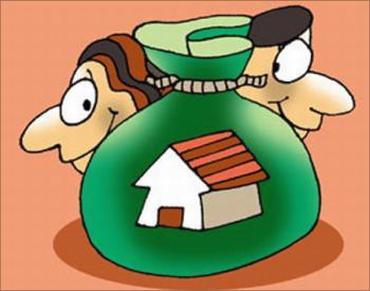
To begin with, these are among the cheapest in the loan market.
Sometimes we come across certain situations when we require a large amount of funds to support our needs. It might be to complete your college education, pay medical bills or may be to consolidate debt. In such situations we mainly look at various finance options but it is really hard for an individual to get a huge amount of loan. To avail a loan without providing collateral worth its amount is just not an easy task. So home equity loans are a great option in such situations.
A home equity loan is a type of loan in which the borrower uses the equity in their home as collateral.
Equity can be defined as the difference between the market value of your house and the amount which you owe on it.
It can also be known as the financial value of a real estate property beyond any sum you owe on it for claims, loans or mortgages.
This kind of a loan is secured as the lender gets the home as collateral and the loan amount depends on the amount of equity.
The borrower is only sanctioned that amount of loan which is equal to her/his equity. This makes them secured loans because here the lender is sure of getting back the loan amount even if the borrower defaults.
Typically, home equity loans are offered at much lower interest rates than other kinds of financing, such as credit cards and personal loans. There are larger repayment periods that range between 5 years and 30 years and you can easily choose the one that suits your repaying capacity. The EMIs on this loan depends on the same factors in which a typical EMI rests such as the amount of loan applied for and the repayment time selected. Similarly even the interest rate varies the EMI.
These loans are categorised in two types -- A home equity loan or a second mortgage and home equity line of credit.
A home equity loan or a second mortgage is the scheme through which one can borrow an amount worth your collateral in lump sum. With this type of home equity loan, interest begins building as soon as the bank issues you the money. Such a loan is paid off by the borrower over a fixed amount of time, comes with a fixed rate of interest and fixed monthly payments. It also known as a close ended loan.
On the other hand there is home equity line of credit that is more like a credit card. It facilitates the borrower to borrow in installments. Here the borrower is issued a cheque book or a credit card by the bank which s/he can use against her/his home's equity to make purchases. S/he can borrow only a certain amount of loan money which s/he needs instead of borrowing and keeping the total lump sum amount.
The interest rate in this type of loan starts building only when the person actually makes a purchase.
A line of credit home equity loan has flexible interest rate that varies throughout the loan term and therefore, monthly payments also fluctuate depending on the varying home loan rates.
Home equity loans are a potentially money-saving option for homeowners who want to consolidate debt. They are easily available to any person depending on her/his credibility and are also very beneficial in terms of the tax rebate that they offer to the borrower.
There are possible tax deductions on home equity loans where as other personal and consumer loans typically have no tax deductions and higher interest rates. It makes them one among the cheapest in the loan market.
Even bad credit borrowers are provided these loans as they are considered risk-free from the lender's point of view. Bad credit people just need to provide their annual income and employment documents to the lender in order to avail such a loan.
Home equity loans are provided by almost all public, private banks and housing finance institutions. However the approval of such a loan depends on the lender's policy and it is the lender who decides how much it is ready to give you for a home equity loan. But it is always better to compare on all the rates that are offered by various home equity loan providers.
Illustration: Uttam Ghosh/Rediff.com









